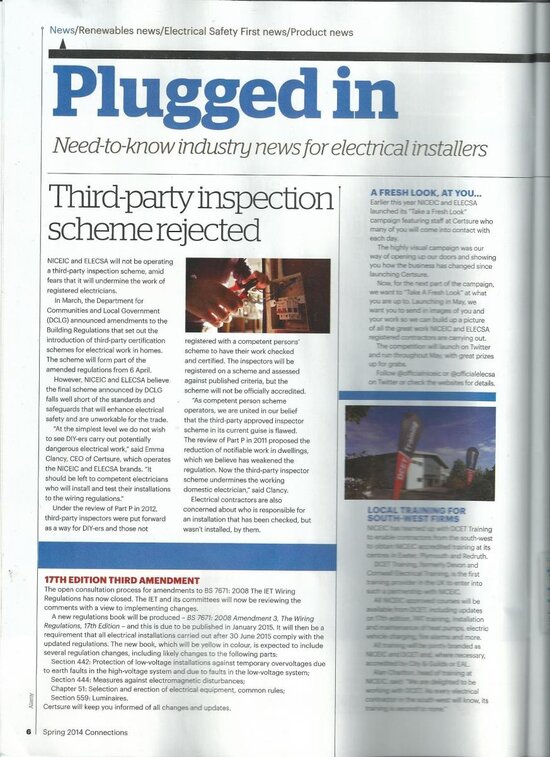just had the rubbish through in connections
here:
 you probably cant make it out very well....but it basically reads like this:
you probably cant make it out very well....but it basically reads like this:
Third-party inspection scheme rejected
NICEIC and ELECSA will not be operating a third-party inspection scheme, amid fears that it will undermine the work of registered electricians.
In March, the Department for Communities and Local Government (DCLG) announced amendments to the Building Regulations that set out the introduction of third-party certification schemes for electrical work in homes.
The scheme will form part of the amended regulations from 6 April.
However, NICEIC and ELECSA believe the final scheme announced by DCLG falls short of the standards and safeguards that will enhance electrical safety and are unworkable for the trade.
"At the simplest level we do not wish to see DIY-ers carry out potentially dangerous electrical work," said Emma Clancy, CEO of Certsure, which operates the NICEIC and ELECSA brands. "It should be left to competent electricians who will install and test their installations to the wiring regulations."
Under the review of Part P in 2012, third-party inspectors were put forward as a way for
DIY-ers and those not registered with a competent persons` scheme to have their work checked and certified. The inspectors will be registered on a scheme and assessed against published criteria, but the scheme will not be officially accredited.
"As competent person scheme operators, we are united in our belief that the third-party approved inspector scheme in its current guise is flawed.
The review of Part P in 2011 proposed the reduction of notifiable work in dwellings, which we believe has weakened the regulation. Now the third-party inspector scheme undermines the working domestic electrician," said Clancy.
Electrical contractors are also concerned about who is responsible for an installation that has been checked, but wasn`t installed, by them.
OK...so you`v read that...now get this:
Domestic installer plans warning
Plans to overhaul the competent persons` scheme for domestic installers could prove burdonsome for electrical contracting firms.
That is the view of NICEIC and ELECSA in response to Parliamentary recommendations for all domestic electricians to have a qualification equivalent to NVQ Level 3 within the next five years.
"While we welcome many of the recommendations made by the committee, we believe the requirement on all individuals, irrespective of the size of the firm or the work the individual undertakes, to be fully qualified places a huge onus in firms," said Emma Clancy, CEO of Certsure, which operates the NICEIC and ELECSA brands.
"To have all employees up to a qualified supervisor (QS) level will push up costs and reduce the need for apprentices. The industry will suffer in the long term. It is also no guarantee of a rise in standards."
Under the current QS system, which all competent person scheme operators use, a firm must employ at least one qualified supervisor with a qualification equivalent to NVQ Level 3. The QS is responsible for the final checking of work and the sign-off that it has been tested and inspected in accordance with the appropriate standards and regulations.
"The majority of electricians out there, working in people`s homes, are fully qualified and competent to carry out the work required of them," added Clancy.
and here`s some more...courtesy of good old Emms:
Fighting your corner
Thank you to all those that wrote in to "have your say" following the recent Select Committee report. The response was great, with many good points being made by contractors.
Two significant factors particularly stood out: qualifications and retail outlets selling electrical equipment to all.
We firmly believe that while qualifications are important, they are not the defining element of a good electrician.
There are many good electricians who have older qualifications and are perfectly competent. Similarly, there are good electricians who have joined the domestic industry after completing a short course and developed their competence through the acquisition of other skills.
Competence requires a mixture of practical skills, knowledge and up-to-date training. Registered electricians also issue certificates, have insurance and provide guarentees for their work. This complete package is tested at the inspection process each year.
We have been assessing companies for over 50 years and we are very comfortable to stand behind them with a badge of competence. To ask every electrician to go back to college and take more qualiifications is impractical. It devalues the real-world experience these people have to offer in providing safe, compliant installations.
Furthermore, while we combine many elements to certify our registered contractors as competent, many retail outlets still sell electrical equipment to the public.
This seriously undermines the value of a competent electrician and, worryingly, implies that electrical work is within the ability of DIY. Installing items such as distribution boards, electric showers and outside sockets is, in our view, well beyond the competence of DIY-ers.
This situation is made much worse with the introduction of a third-party inspection scheme. This is a huge step backwards for Part P and electrical safety.
As one of our respected customers told me, "I make no claim to be perfect, only a fool would do that. But I do everything I can to ensure the safety of my customers, my colleagues and myself. The answer is to maintain the standards of assessment and target those working outside regulation and not tar everyone with the same brush."
Please be assured we will do as you ask.
Well, if you`v managed to get through all that without falling asleep then some thoughts, comments & opinions would be appreciated










